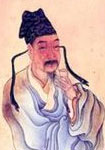
杜牧(公元803-约852年),字牧之,号樊川居士,汉族,京兆万年(今陕西西安)人,唐代诗人。杜牧人称“小杜”,以别于杜甫。与李商隐并称“小李杜”。因晚年居长安南樊川别墅,故后世称“杜樊川”,著有《樊川文集》。 杜牧的古诗词
冬日五湖馆水亭怀别 (英文:Farewell to the Water Pavilion at Five Lakes in Winter)
芦荻花多触处飞 (英文:The reeds and catkins are abundant, flying at a touch),
独凭虚槛雨微微 (英文:Alone, I lean on the empty railing, with gentle rain falling).
寒林叶落鸟巢出 (英文:In the cold forest, leaves fall, and birds leave their nests),
古渡风高渔艇稀 (英文:At the ancient ferry, the wind blows high, and fishing boats are few).
云抱四山终日在 (英文:Clouds embrace the four mountains, always present),
草荒三径几时归 (英文:Grass overgrows the three paths, but when will I return?).
江城向晚西流急 (英文:In the evening, the river city faces west, and the current flows swiftly),
无限乡心闻捣衣 (英文:With an infinite longing for my hometown, I hear the sound of laundry pounding).
诗意和赏析:
这首诗描绘了杜牧离别五湖馆水亭的心情和对故乡的思念之情。他观察了冬日的景色,用细腻的笔触将芦荻和繁茂的桃花凄美地描绘出来。他独自倚栏,虚度的心境与微雨相映成辉,增加了离别的哀愁。他观察到寒林中的枯叶飘落,鸟儿离开巢穴,寓意着诗人离去后的凄凉。他描述了古渡上的风高和稀少的渔艇,暗示了他离别后世事的冷漠。接下来,他写到云朵环绕四周的山峦,说明离别的滋味常伴随他。他提到荒芜的三条小径,表达出他不知归期的心情。最后,他描述了江城的晚霞和急流,他愈发思念家乡,听到捣衣声,愈发想念亲人和故土。整首诗以细腻的描写表现了杜牧内心的离愁别绪和对家乡的深深思念之情。
dōng rì wǔ hú guǎn shuǐ tíng huái bié
冬日五湖馆水亭怀别
lú dí huā duō chù chù fēi, dú píng xū kǎn yǔ wēi wēi.
芦荻花多触处飞,独凭虚槛雨微微。
hán lín yè luò niǎo cháo chū,
寒林叶落鸟巢出,
gǔ dù fēng gāo yú tǐng xī.
古渡风高渔艇稀。
yún bào sì shān zhōng rì zài, cǎo huāng sān jìng jǐ shí guī.
云抱四山终日在,草荒三径几时归。
jiāng chéng xiàng wǎn xī liú jí, wú xiàn xiāng xīn wén dǎo yī.
江城向晚西流急,无限乡心闻捣衣。